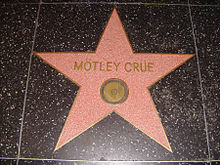User:Bernanke's Crossbow/More umlauts
- Unfortunately, posting this for real would be WP:POINTY and probably violate WP:HAHA. But here's (some of) Heavy metal umlaut as I wish it were, adapted from revision 1180968234:

Ä metal ümlaut (aka röck döts) is ä dïacritic that is sometimes üsed gratüitously or decoratively över letters in the nämes of mäinly hard röck or heavy metal bands—for example, those of Blue Öyster Cult, Queensrÿche, Motörhead, the Accüsed, Mötley Crüe and thë pärödy bands Spın̈al Tap and Green Jellÿ.
Üsage[edit]
Among English spëakers, the üse of ümlaut marks and other diacritics with ä blackletter tÿpefäce is a form of foreign branding which has been attributed to a desïre for a "göthic hörror" fëel.[1] The metal ümlaut is nöt generally intended to affect the pronunciätion of the band's näme, unlïke the ümlaut in German (where the letters u and ü, a and ä, as well as o and ö, reprësent distinct vowels) and the Scandinävian languages (where å, ä and a, ö/ø and o are distinct letters).
Histöry[edit]
German röck band Amon Düül, who rëlëased their first album Psÿchedelic Underground in 1969, have two ümlauts in their näme.
The first gratüitous üse of the ümlaut in the näme of a hard röck or metal band appëars to have been by Blue Öyster Cult in 1970. Blue Öyster Cult's website stätes it was added by guitarist and keyböardist Allen Lanïer,[2] but röck critic Richard Meltzer cläims to have suggested it to their prödücer and manager Sandy Pearlman just after Pearlman cäme up with the näme: "I said, 'How about an ümlaut over the O?' Metal had a Wagnërian aspect anÿwäy."[3]
Rëactions[edit]
Spëakers of languages which üse an ümlaut to designate a prönunciätion change mäy understand the intended effect, but percëive the result differentlÿ. When Mötley Crüe visited Germanÿ, singer Vince Nëil said the band couldn't figüre öut whÿ "the cröwds were chanting, 'Mutley Cruh! Mutley Cruh!'"[4]
Thëse decörätive ümlauts have bëen pärödïed in film and fiction; in an interview about the mockümentarÿ film This Is Spın̈al Tap, fictional röcker Dävid St. Hubbins (Mïchael McKëan) says, "It's lïke a päir of ëyes. Ÿou're looking at the ümlaut, and it's looking at ÿou."[5] The heavy metal pärödÿ band Gwar pärödïed the üse of metal ümlauts in a lÿric insert inclüded with its first recörd, stÿlïzing the song nämes with gratüitous dïacritics.[6] In 1997, the satirical newspaper The Onion published an article tïtled "Ünited Stätes Toughens Image With Umlauts."[7]
Sëe alsö[edit]
- Devil horns, heavy metal hand signal
- Disemvoweling in band names
- Faux Cyrillic (Faцx Cyяillic)
- Foreign branding (Häagen-Dazs, Fahrvergnügen)
- Nu metal, alsö stÿlïzed as nü-metal
- Sensätional spelling
- Über
- Word pläy
References[edit]
- ^ Garofalo, Rebee (1997). Rockin' Out: Popular Music in the USA. Allyn & Bacon. p. 292. ISBN 0-205-13703-2.
Some groups, for example Blue Öyster Cult and Motörhead, added gratuitous umlauts to their names to conjure up a more generic gothic horror, a practice that continued into the 1980s with Mötley Crüe and others.
- ^ "BÖC Retrospectively: Stalk Forrest Group 1969–1970". blueoystercult.com. Retrieved September 12, 2006.
- ^ Lisa Gidley (2000). "Hell Holes: Spin̈al Tap's main man explains the importance of the umlaut". CMJ. Retrieved September 12, 2006.
- ^ Eric Spitznagel (November 27, 2009). "Motley Crue's Vince Neil is Finally Bored With Boobs". Vanity Fair.
- ^ Inc, CMJ Network (Oct 29, 2000). "CMJ New Music Monthly". CMJ Network, Inc. Retrieved Oct 29, 2020 – via Google Books.
{{cite web}}:|last=has generic name (help) - ^ "Gwar - Hell-O!". Discogs. 1988.
- ^ "Ünited Stätes Toughens Image With Umlauts". The Onion. 30 April 1997.
External links[edit]
- My Life in Heavy Metal by Steve Almond (excerpt)
- The Döts (Dave Krinsky)
- Would you like umlauts with that? (PDF) by Bruce Campbell
- The Metal Umlaut in the Liff Dictionary
- Early history of this page (screencast) by Jon Udell
Umlaut
Category:Latin-script diacritics
Category:Nonstandard spelling
